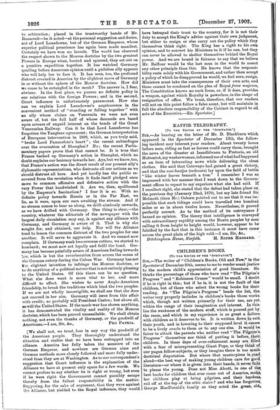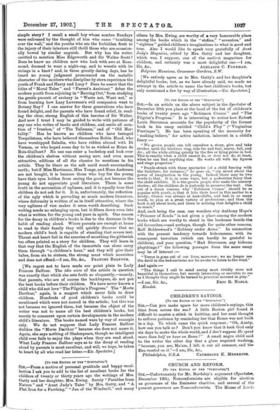CHILDREN'S BOOKS.
rTo THE EDITOR OF THE "SPECTATOR."]
SIR,—The writer of "Children's Books, Old and New," in the Spectatorof December 20th, seems to me to render scant justice to the modern child's appreciation of good literature. He thinks the percentage of those who have read "The Pilgrim's Progress " and "Robinson Crusoe " would be small. I doubt if he is right in this; but if he is, it is not the fault of the children, but of those who select the wrong books for their reading. As "The Pilgrim's Progress" beads the list, the writer very properly includes in children's books those works. which, though not written primarily for their use, are yet within the range of their imagination and interest. In this lies the weakness of the modern stuff, which is poured put by the ream, and which in my experience is as great a iailure with children as it deserves to be. It is written down to suit. their youth, and in lowering to their supposed level it ceases to be a lively oracle to them or to any one else. It would be fairer to attack the parents who neither read "The Pilgrim's Progress" themselves nor think of putting it before their, children. In these days of over-refinement many are filled with a fear of misrepresenting Giant Pope, or they think of our pagan fellow-subjects, or they imagine there is too much doctrinal disputation. But where that masterpiece is ;read aloud—the best way of making young children care for gooil, literature—or where it is given into their hands, it never fail* to please the young. Does not Miss Alcott, in one of thoi best books for children that ever came out of America, make, her children play at being pilgrims, and their burden, roll off at the top of the attic stairs ? and who has forgotten, George MacDonald's family as they acted the great, old„ simple story ? I recall a small boy whose sombre Sundays were enlivened by the thought of him who came "tumbling over the wall," and the youths who ate the forbidden fruit to the injury of their interiors still thrill those who are occasion- ally bowed by similar anguish. But why has the writer omitted to mention Miss Edgeworth and Sir Walter Scott ? Does he know no children now who look with awe at Rosa- mond, doomed to wear a night-cap, and to wrestle with its strings in a knot ? and, in these greatly daring days, has he heard no young judgment pronounced on the metallic character of the mothers who discipline by stern experience the youth of Frank and Harry and Lucy ? Dare he assert that the titles of "Moral Tales" and "Parent's Assistant" debar the modern youth from rejoicing in" Barring Out," from studying the gentle pursuit of archery in "Waste not, Want not," or from learning how Lazy Lawrence's evil companion went to Botany Bay ? I can answer for three generations who have found delight, and for parents who have found relief, in read- ing the clear, strong English of this heroine of Sir Walter. And now I trust I may be guided to write with patience of any one who writes of books and children, and omits all men- tion of "Ivanhoe," of "The Talisman," and of "Old Mor- tality?' Has he known no children who have besieged Torquilstone, who have believed themselves Robin Hood, who have worshipped Saladin, who have ridden abroad with Di Vernon, or who hoped some day to be as wicked as Brian de Bois-Guilbert? No one can enter a bookshop and look over the children's shelves without seeing new, and even more attractive, editions of all the classics he mentions in his article. They lie there 1113 the salt amid much surrounding earth ; but if Miss Martineau, Miss Yonge, and Hans Andersen are not bought, it is because those who buy for the young have their eyes holden from seeing the good, not because the young do not appreciate good literature. There is some truth in the accusation of ugliness, and it is equally true that children do not ask for it. It is, unfortunately, the reflection of the ugly which is pervading so much modern literature, where deformity is written of as in itself attractive, where the very ugliness of vice makes it seem worth describing. Such writing needs no enlarging upon, but it filters down even into what is written for the young and pure in spirit. One reason for the decay in children's books is due to the decrease in the habit of reading aloud. Where parents are enough at home to read to their family they will quickly discover that no modern child's book is capable of standing that severe test. Throat and heart fail in the exercise of mouthing the gibberish too often printed as a story for children. They will learn in that way that the English of the immortals can alone carry them through "a children's hour," and they will give their babes, from six to sixteen, the strong meat which nourishes and does not offend.—I am, Sir, &C., FRANCES BALFOUR.
[We regret not to have made our point plain to Lady Frances Balfour. The idie mere of the article in question was exactly that which she sets forth so eloquently,—namely, that parents, who are of course the bookbuyers, do not put the best books before their children. We have never known a child who did not love" The Pilgrim's Progress." The " Morte Darthur," again, is a magnet which never fails to draw children. Hundreds of good children's books could be mentioned which were not named in the article ; but this was not because we ignored them, but because the object of the writer was not to name all the best children's books, but merely to comment upon certain developments in the modern child's literature. The books named were by way of example only. We do not suppose that Lady Frances Balfour dislikes the " Morte Darthur " because she does not name it. Again, she says nothing of Shakespeare, though no intelligent child ever fails to enjoy the plays when they are read aloud. What Lady Frances Balfour says as to the decay of reading aloud by parents is most excellent, and will, we hope, be taken to heart by all who read her letter.—En. Spectator.]







































 Previous page
Previous page